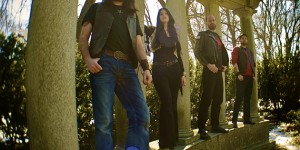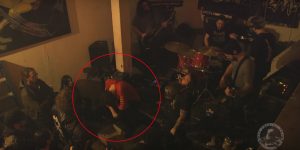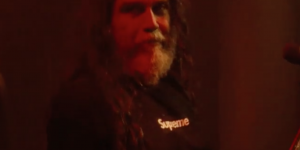Blood Ceremony want to soundtrack your pagan metal party
by Michael Rancic
April 7, 2016
Toronto's Blood Ceremony channel occult fascinations on their new album 'Lord of Misrule.'
When I went into my interview with Lucas Gadke and Sean Kennedy of Toronto heavy metal outfit Blood Ceremony, I didn’t expect that our conversation would end with us all griping about the city’s awful real estate market. We joked that I should cut out the rest of our conversation and only leave in the parts about how expensive it is to buy a home in the city, just to show a different side of the band. I settled on leading with it, because joke or not, Blood Ceremony’s music relies heavily on the banal and the everyday, in order to flip it into something fantastical.
The band’s latest record, Lord of Misrule, is named for the ceremonial position given to someone of lower social status, who is then responsible for presiding over The Feast of Fools, a pre-Christian English carnivalesque tradition. That brief but extravagant topsy-turvying of social hierarchies and statuses is a theme that the band revel in, and while the record isn’t heavily driven by this concept, the varying musical styles explored through each song make it its own veritable feast.
I caught up with the quartet right before they set off for Europe where they’ll be on tour for the next month. We spoke about the band’s new record, their fascination with the occult, the social revolution inherent in the carnivalesque, and what it takes to sound as singular as Blood Ceremony.
AUX: Your last record, The Eldritch Dark, came out in 2013. In 2014 you released a 7″ called “Let It Come Down”. At what point did you start working on material for Lord of Misrule?
Sean Kennedy: We played a couple of shows in the fall of 2014 with Pentagram in the U.S., and after that set of shows, we decided to focus more on making a record.
Lucas Gadke: “Let It Come Down” was actually supposed to be on the album, but I think the album kind of grew…
This album?
S: Yeah, we thought about re-recording it and adding it to this record. We released it as a 7″ just prior to our last European tour, just for the sake of having something new out there for people to listen to when we went out. The idea originally was to include it but the song ideas kept coming.
L: The new song ideas felt cohesive as a whole. So we just left “Let It Come Down” be its own thing.
Was this your first time recording in the UK?
S: Yes it was.
So because of the distance I imagine you must’ve had most things ready ahead of time. I know some bands tend to write in the studio.
L: All the songs were finished and charted out and arranged by the time we got to the studio. I think the only thing we left to chance was what kind of tone we were going to use on the guitar, what kind of overdubs we would put on it. Everything else was already pretty solid. Some things were stripped away. I think that’s one of the only things that really happened in the studio. Liam Watson, who’s a great producer, he stripped a couple things down. There wasn’t a lot of writing on the spot, at all.
S: Yeah he gave us a bit of guidance on the song “Flower Phantoms.” He has a lot of experience recording soul and stuff like that. He was just saying, “less is more” on that song. He was taking parts away, so the guitar part changed quite a bit on that song.
How did you connect with Liam?
S: We’re familiar with his stuff. He’s done a lot of big records, worked with Billy Childish and with Electric Wizard.
L: That’s the main one, the Electric Wizard connection.
S: He’s friends with Lee Dorrian who runs our record label, Rise Above. We’ve always wanted to record there, from the start of our band, and this was really the first opportunity we had to do it. Each record we’ve done more and more of an analog process. Each record before this one has been about half and half. With our last record, The Eldritch Dark, we recorded all to tape.
L: But we did all the editing on the computer. All the editing was done in Pro Tools.
S: This time we wanted to have the process 100% analog.
What appeals to you about recording completely analog?
L: For me it’s a way of forcing us to make a decision. When Alia would do her backup vocals, you’ve got the band on three or four tracks, you’ve got drums on one track, then bass, guitar, and keyboard, and once Alia throws down her backing vocals on it, that’s on four tracks. Liam would say, “alright, are you guys happy with that? I’m going to mix it down now, speak now or forever hold your peace.” You’ve got to commit.
S: It demands more of the engineer and it demands more of the band in terms of performance. You have to. It was kind of exciting to know that you were on the spot and you’ve got to get this right. It gives it more of a live feeling and more energy. And working with analog presents you with a bit more limitations, which is part of the appeal. Like the sonic limitations of the sound, like the way it compresses drums — those are all sounds that we’ve heard growing up from the golden era of psychedelic and heavy rock, and those happen to be the sounds we like the best as well. You can emulate that with Pro Tools, or you could just do it for real. It’s cool that there are studios out there like Toe Rag that are very special in this day and age. Liam knows that studio inside out.
L: This is the first record we’ve done with a consistent line-up, meaning the last record and this record have the same players on it. I think we’ve really settled into trusting each other in the room. It feels really good. We can just say “roll tape” and play and know it’s going to be good.
How does your songwriting process work? When did you first encounter the idea of the “Lord of Misrule” and decide you wanted to incorporate it into an album or song?
S: I guess all the ideas that go into the songs are kind of accumulative, and this record is like an extension of the obsessions of the band from prior records. The idea of the Lord of Misrule is this sacrificial figure from the Saturnalia, and that ties into the band really. Blood Ceremony. That really is what the band is and the area we’ve been interested in thematically from the beginning. As far as songwriting, we all write separately and then bring ideas to the space. Then everyone will hammer away at it.
L: It’s a fairly democratic process.
S: Going back to the idea of playing together for so long, there’s a lot of trust between us.
L: No egos. Working in this band has been one of the easiest musical experiences of my life.
S: “Old Fires”, which was one of the first songs released on YouTube, that was just a couple of ideas of Lucas’ and mine that we combined together.
L: That came together super-fast. It was just like, I wrote a riff, Sean wrote another, and we just sort of jammed it out. We’re a fan of jamming, though I don’t think that necessarily comes across on the albums themselves. We just work it out as a band.
Even though your material is steeped in these dense ideas and stories, they’re not weighted down by them. How do you find that balance?
S: We try to not have an overly serious tone. There’s a lot of playfulness in the lyrics. I think the best way to do that is the fact that we focus on ancient partying more than anything. [Laughs]
L: The question of whether we’re actually pagans, whether we take this stuff seriously used to come up a lot. People in my everyday life still ask that question. It’s an odd way to frame it. Well I do take it seriously because I like it and I think it’s interesting, but we’re not necessarily running around at midnight in a field pouring out cups of blood. But because we’re not doing it, does that mean we’re not taking it seriously?
S: I think when the occult rock tag came along, seven or eight years ago now, there was this question about authenticity, which meant that we had to be dour-faced Satanists to be able to broach these topics, saying nothing of the importance of presence or performance.
Is everyone in the band equally interested in the occult?
S: I think we all share a similar taste in the late ’60s and early ’70s heavy rock period, where progressive rock began. We all share a love of horror films.
So your way into it was through music and film, not necessarily diving right into Aleister Crowley’s writing?
S: Well, that too. All of the above.
L: I always say it’s like signifiers on signifiers on signifiers. We’re signifying our own take on a 1960s take on a 19th century interpretation of a 13th century interpretation. It all passes through these filters and you can’t step away from the way you’re exposed to something or the way you see it.
S: The only honest way to make music is to try and make music that you like to listen to. That’s really the only way to do it genuinely. There was this period in the 1960s where there was a real popular fascination with the occult: suburban witchcraft, séances. And it was happening at the same time this heavy rock scene was starting. I think that’s a really exciting connection. Bands like Black Sabbath changed music.
Folk bands from the same period, like Pentangle, had a strong obsession with those themes as well.
L: Fairport Convention was really into looking up connections to a pagan past, finding modern folklore which still echoes Anglo Saxon or Celtic traditions.
People often characterize your music with words like “retro” or “throwback”. Do you think your music is nostalgic?
S: No, I think we’re definitely a modern band, but we have an appreciation for the past and tradition. Bands like Steeleye Span and Fairport Convention they revisited these ballads, but played them like an electric rock band. We do what we do, but we have and eye and ear to the past.
What is it about the connection between metal music and the occult that has endured? It’s not that difficult to draw a line from the kind of occult ideas Black Sabbath focused on to the appeals to Norway and Sweden’s pre-Christian roots in styles like black metal.
S: Heavy metal music has always been very energized by extremes and sensations. It’s very sensational music. The idea of devil worship, satanism, demonology, these are very sensational subjects, and they fit the energy and immediacy of the music. I think that’s a natural combination of extreme music and imagery.
L: I think there’s also like a want to equate something pagan with being in a trance, or being closer connected to something that’s more numinous I suppose. When you’ve got volume and evil sounds, it’s easy to put somebody into a trance like state.
S: Yeah, definitely that. There’s vitality to these stories and myths. If you look at some of the Greek mythology, you can understand it still because the gods act like we would. They would have temper tantrums, they would be jealous and do things that they didn’t even understand. There was vitality to those stories, an energy and power that metal music tries to channel. Going back to the folk music and Brit folk stuff, I find that stuff as equally powerful as the metal stuff. Thinking of an album like Liege & Lief by Fairport Convention, it’s’ just full of bloodshed, and those are some really powerful songs too.
So you’re drawing from English bands drawing on English traditions and made the album in England for an English label. What’s your connection to that place?
S: It has a strong connection for me because my family is from there. Rise Above is a special label for us. The aesthetics of the label, whether it’s based in California or Canada or anywhere, we’d feel the same way. Recording in England just came together that way. I guess some of the lyrics are inspired by English stories and things but it wasn’t planned. Over time it just felt more and more as we were there that this was a very English record.
L: England has in it all the varying traditions of Western European culture. It was at one time Roman, it was at one time North Germanic, it was at one time Celtic, it was at one time French. It’s evolved out of all of these cultures mixing together. You can kind of see everything in traditional English culture. They do the feast of fools thing, which is still really heavily Roman…
Still?
S: I think it disappeared around the time of the Renaissance but that sense of carnival still exists.
L: They still do mumming there, I believe. Don’t they? I know they do it in Newfoundland. Do you know about that? They dress up in these bizarre costumes, and they go around house to house and will sit in your kitchen and play music for you, a kind of caterwauling music.
S: That idea of hierarchies being upset, lines being blurred and that sense of carnival. That still exists today. Christmas office parties are a great example. [Laughs]
L: The solstice is still an important time, and back then it was because the work year stopped. It was the first time in a long time anyone could take a break, there’s an abundance of meat, and it feels like a special, serious time. It still feels that way around Christmas time. It feels different, like the spirit world is closer.
What appeals to you about overturning hierarchies?
S: The title of our last album, The Eldritch Dark, suggested a kind of liminal sphere, a place in the woods or anywhere really that was outside the ordinary. We’ve always liked this idea of leaving the everyday, and a lot of our songs are about strange happenings.
L: Brushes with the supernatural.
S: “You have now entered the twilight zone,” basically. Lord of Misrule seemed like a good idea for a rock album. You want something that’s just a little bit unsettling and out of the ordinary. That strangeness appealed as an idea.
L: Maybe I’m reading too much into this but sometimes being in a rock band or seeing a rock band perform is its own transformative flipping experience. You feel bigger than you are. Listening to the music, seeing a metal or rock band live, I think you step out of everyday life for a minute, and you feel on top.
In another interview you talked about how the band thought about incorporating an actual Lord of Misrule narrating between tracks?
S: Well, that it was an idea we just tossed around.
Ultimately you decided it wasn’t for the band?
L: It would’ve been a bit departure for us I think.
S: I remember listening to The Who Sell Out, and they had fake radio ads and stuff. I like albums like S.F. Sorrow by The Pretty Things. But when it came down to it, the album became very song oriented, and we were focusing on each song separately, and it didn’t feel as much like there was this continuous thread other than having this presiding figure, the Lord of Misrule.
How do you decide what sounds like Blood Ceremony and what doesn’t? Is that an ongoing conversation?
S: No, not really.
L: When you get the four of us in the room, it’s Blood Ceremony. We can’t really do anything else. Outside of the band, sure.
S: I literally can’t do anything else. [Laughs]
Tags: Music, Featured, Interviews, Blood Ceremony, doom metal, lord of misrule, metal





